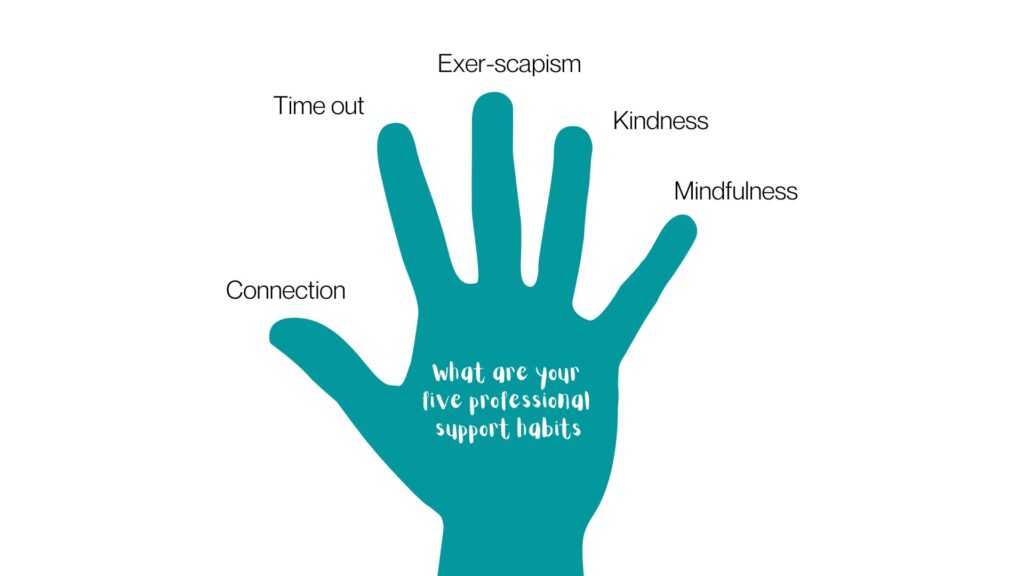Future Leaders need to take resilience in hand


Like so many systemic problems in our society, the questions we ask around mental health far outweigh the answers we fall back on.
Are you okay? Are you really okay? Are we really okay?
As leaders, what can we do to be better?
Why do 20% of us experience a mental illness in any year? Even prior to a global pandemic, we were experiencing a mental health epidemic. In order to seek out intelligent answers these questions, I spoke with mental and environmental health leader Dawn O’Neil AM. Dawn is the former CEO of Beyond Blue and Lifeline Australia. Today she is the CEO of ewater systems, fighting to reduce chemicals in the environment.
One of the things Dawn taught me that really resonated was that building resilience is not a one-person job, nor a one-solution strategy. Resilience takes multiple conversations, many different approaches and a host of people working together. Dawn introduced me to her mental health Five Finger Support Strategy – some of the best advice I’ve ever had, and an idea I now use daily.
It’s important to challenge the idea that being resilient falls entirely on one’s own shoulders. Rather than just expecting ourselves to ‘be more resilient’, how do we develop a set of resilience tools and relationships in order to bring that reality to life?
‘One of the strategies I love thinking about is our hand, and how we care for something by wrapping all of our fingers around it. Having one strategy is not enough. To me, our five fingers represent the need to have five support strategies to help us stay mentally healthy.’ – Dawn O’Neil
Dawn speaks with the insight of a leader who has spent more time listening than talking throughout her life. She points out that even for many of us who would consider ourselves mentally healthy, we exist on a sliding scale of wellness. Acute or chronic stress, brought on by something like a pandemic, can have the ability at any time to render our coping mechanisms null and void. When this happens, underlying issues of anxiety or depression that we may have normalised through routine coping strategies get thrown out of whack.
Dawn says that the strategies that form the ‘Five Finger Support Strategy’ model of wellbeing will shift and change depending on the circumstance and challenges faced, the key being the use of multiple approaches. When the COVID pandemic took hold of the world it brought a degree of focus to mental health and strategies for dealing with stress.
Why not try the Five Finger Support Strategy yourself?
One of the favourite activities in The Leading Edge 28 Day Challenge has been building this strategy… what an easy way to ask yourself “Are you okay?” every day.
1) Write down your social wellbeing habit: How are you keeping in touch with people through face-to-face contact, phone calls, a text message or social media? Connection is critical to wellbeing.
2) Write down your time out habit: What are your time out mechanisms to break up the routine? Whether it’s from long stints sitting down on your computer, endless zoom calls, or extended time in close proximity with other people. Scheduling time out will help shift your mood, energy, headspace.
3) Write down your “exer-scapism” habit: Managing a build-up of stress and anxiety can be helped by exercising or escaping via an activity such as dance, singing, or yoga.
4) Write down your mindfulness habit: Be more present and engaged in life. Your strategy may be as simple as ten deep breaths, or may incorporate ideas such as self talk, journaling, single tasking, mindful eating or mindful acknowledgement of nature.
5) Write down your kindness habit: How are you showing up for others? How are you reaching out, giving support or doing something generous for a neighbour? Never forget that simple acts of kindness make us feel good about ourselves, the world and the future.
As leaders, we must be able to navigate our own mental health in order to recognise, destigmatise and model healthy behaviours for those around us. All too often, we have a ‘one strategy’ approach to helping people through adversity. For example, when I ask leaders what practical mental health support they have in place, an employee assistance program (EAP) phone line is often the only thing they can reference. Yet we know that while mental health costs Australian businesses $12.8 billion annually, only 4.4 per cent of employees use their EAP service.
I encourage you to wrap your hand around Dawn’s five-finger approach and know by heart the things that bring you back to yourself when you’re not feeling okay. Mental health is a sliding scale of wellness. And if we can start to self-correct on the smaller ebbs and flows, we will have strategies in place when the bigger punches of life occur. Just like you wouldn’t build a structure with a single support beam and expect such a structure to bear a load, nor should we expect single points of strength will support the weight of our struggles.
Dawn O’Neil AM and the ‘Five Finger Support Strategy’ feature in my book The Leading Edge, please head to The Leading Edge page on this website if you’d like me to send you a signed copy!
Call the Beyond Blue helpline on1300 22 4636 if you need to talk.
